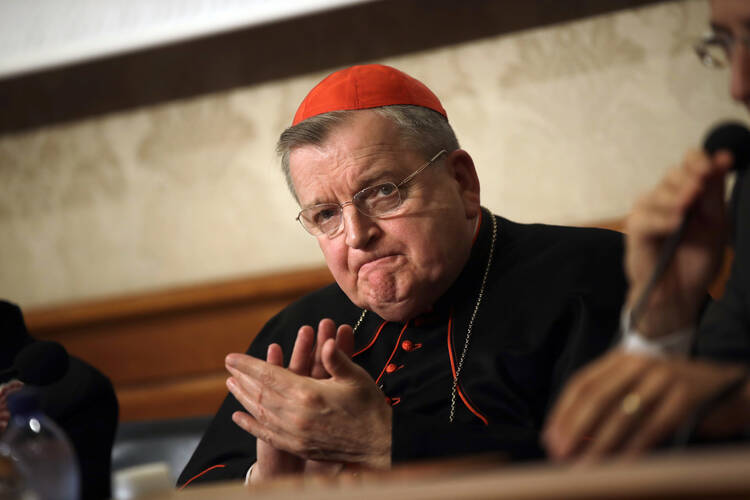MADISON, Wis. (AP) — Cardinal Raymond Burke, one of the Catholic Church’s most outspoken critics of Pope Francis and a vaccine skeptic, said he has COVID-19 and his staff said he is breathing through a ventilator.
Burke tweeted Aug. 10 that he had caught the virus, was resting comfortably and was receiving excellent medical care.
“Please pray for me as I begin my recovery,” the 73-year-old Burke said in the tweet. “Let us trust in Divine Providence. God bless you.”
On Saturday, his staff tweeted that he had been hospitalized and was on a ventilator, but that doctors were encouraged with his progress.
Cardinal Raymond Burke, one of the Catholic Church’s most outspoken critics of Pope Francis and a vaccine skeptic, said he has COVID-19 and his staff said he is breathing through a ventilator.
“(His Eminence) faithfully prayed the Rosary for those suffering from the virus ... Let us now pray the Rosary for him,” his staff said.
The Washington Post and the St. Louis Post-Dispatch reported that Burke became infected during a visit to Wisconsin and was hospitalized there. Burke was born in Richland Center in southwestern Wisconsin and served as bishop in the Diocese of La Crosse from 1995 to 2004.
COVID-19 cases have been surging in Wisconsin in recent weeks due largely to the delta variant. The state’s seven-day case average stood at 1,139 as of Wednesday, the highest it’s been since February.
The diocese had no immediate information Monday on where Burke was hospitalized. A spokesman for the Wisconsin Hospital Association said he had no information on Burke. Vatican media officials didn’t immediately respond to an email.
Burke holds a doctorate in canon law. He moved from the Diocese of La Crosse to become archbishop of St. Louis. He spent more than four years in that position, leaving in August 2008 to oversee the Vatican’s supreme court. He was the first American to hold that position.
Cardinal Burke spoke out against mandatory vaccinations and said the best weapon for battling “the evil of the coronavirus” is a relationship with Jesus Christ.
Burke has built a reputation as an outspoken conservative. He drew attention in the U.S. in 2004 when he said he would deny Holy Communion to Democratic presidential nominee, John Kerry, a Roman Catholic who supports abortion rights.
Pope Francis reassigned Burke from the Vatican court in 2014 after he said the church was like a ship with no rudder.
Burke also criticized the University of Notre Dame, in 2009, over its plans to give then-President Barack Obama an honorary degree because Obama supports abortion. In March of this year, he criticized Pope Francis for issuing a decree limiting the Latin Mass at St. Peter’s Basilica to two hours a day in the structure’s grottos.
He also has criticized how governments have handled the pandemic, referring to the virus in a homily last December as the “Wuhan virus,” a derogatory term coined by former President Donald Trump to describe the coronavirus and warning people that governments were manipulating them. In May 2020, he spoke out against mandatory vaccinations, saying some in society want to implant microchips in people.
He said in March 2020 that the best weapon for battling “the evil of the coronavirus” is a relationship with Jesus Christ.









